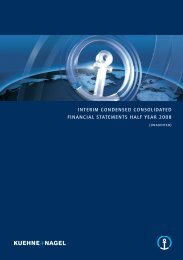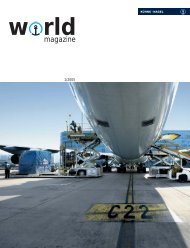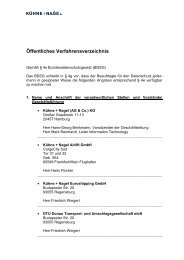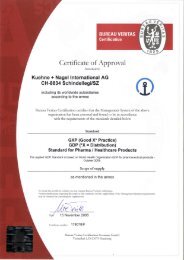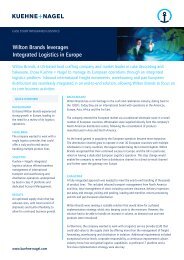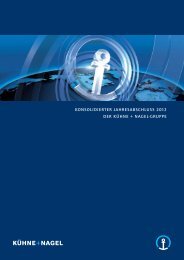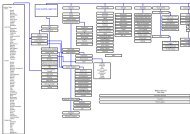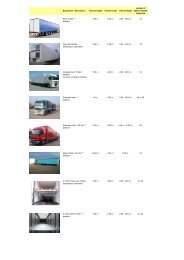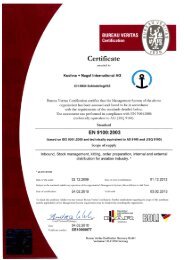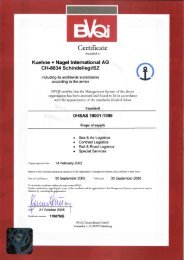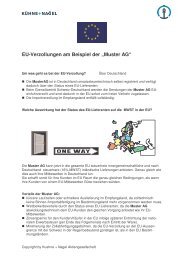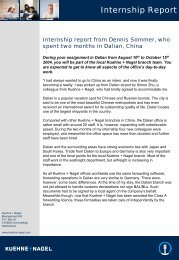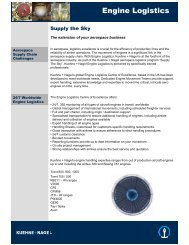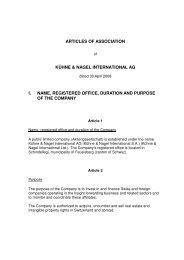ANNUAL REPORT 2011 - Kuehne + Nagel
ANNUAL REPORT 2011 - Kuehne + Nagel
ANNUAL REPORT 2011 - Kuehne + Nagel
Create successful ePaper yourself
Turn your PDF publications into a flip-book with our unique Google optimized e-Paper software.
86<br />
Consolidated Financial Statements <strong>2011</strong> _ _ _ _ _ _ Other Notes<br />
29 Investments in joint ventures<br />
As of December 31, <strong>2011</strong>, the following investments in joint ventures<br />
are held (all with 50 per cent voting rights/KN share):<br />
— KN-ITS S.A.L., Lebanon<br />
— Cologic S.A., Luxembourg<br />
— <strong>Kuehne</strong> + <strong>Nagel</strong> Drinkflow Logistics, Ltd., Great Britain*<br />
— <strong>Kuehne</strong> + <strong>Nagel</strong> Drinkflow Logistics (Holdings) Ltd.,<br />
Great Britain<br />
— Sindos Railcontainer Services S.A., Greece<br />
* During 2010 additional share capital of CHF 36 million was contributed to close<br />
existing long-term finance facilities.<br />
The table below provides a summary of financial information on<br />
joint ventures (100 per cent):<br />
CHF million Dec. 31, <strong>2011</strong> Dec. 31, 2010<br />
Non-current assets 54 67<br />
Current assets 59 36<br />
Non-current liabilities – 2<br />
Current liabilities 34 16<br />
Net invoiced turnover 303 376<br />
Earnings for the year – 1<br />
No investments in associates were held at December 31, <strong>2011</strong><br />
and 2010.<br />
30 Work in progress<br />
The position increased from CHF 253 million in 2010 to<br />
CHF 275 million in <strong>2011</strong> which represents a billing delay of<br />
5 working days against the previous year’s 4.6 working days.<br />
31 Trade receivables<br />
CHF million <strong>2011</strong> 2010<br />
Trade receivables 2,345 2,134<br />
Impairment allowance –67 –57<br />
Total trade receivables 2,278 2,077<br />
The majority of all billing is done in the respective Group companies’<br />
own functional currencies and is mainly in EUR 45.2 per<br />
cent (2010: 47.4 per cent), USD 12.6 per cent (2010: 13.3 per<br />
cent) and GBP 8.9 per cent (2010: 6.9 per cent).<br />
No trade receivables in <strong>2011</strong> and 2010 are pledged.<br />
The Group has a credit insurance program in place, covering<br />
trade receivables, focusing mainly on small and medium exposures.<br />
The credit insurance policy covers up to 80 per cent of the<br />
approved customer credit limit, excluding any items more than<br />
120 days past due. As a company policy, the Group excludes<br />
companies meeting certain criteria (so-called blue chip companies)<br />
from its insurance program.<br />
The Group establishes an impairment allowance that represents<br />
its estimate of incurred losses in respect of trade receivables. The<br />
two components of this impairment allowance of CHF 67 million<br />
(2010: CHF 57 million) are:<br />
— specific loss component that relates to individually significant<br />
exposure<br />
— collective loss component based on historical experience.<br />
Trade receivables with credit insurance cover are not included in<br />
the impairment allowance. The individual impairment allowance<br />
relates to specifically identified customers representing extremely<br />
high risk of being declared bankrupt, Chapter 11 companies in<br />
the USA and customers operating with significant financial<br />
difficulties (such as negative equity). The impairment allowance<br />
for individually significant exposures is CHF 42 million at yearend<br />
<strong>2011</strong> (2010: CHF 37 million).<br />
The collective impairment allowance based on overdue trade<br />
receivables is estimated considering past experience of payment<br />
statistics. The Group has established a collective impairment<br />
allowance of CHF 25 million (2010: CHF 20 million) which represents<br />
2.6 per cent (2010: 2.3 per cent) of total outstanding<br />
trade receivables, excluding trade receivables with insurance<br />
cover (see above) and trade receivables included in the individual<br />
impairment allowance.<br />
The majority of the trade receivables not past due relates to<br />
customers who have good track record with the Group and are<br />
subject to yearly credit risk assessments. Therefore, the Group<br />
does not believe that an additional impairment allowance for<br />
these trade receivables is necessary.



